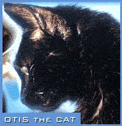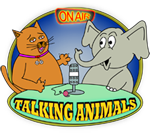(circa Nov. 1989 – Jan. 4, 2006)
Almost fifteen years ago, when I began dating Colleen McGarr, who’s now my wife, she was living with a sleek black cat named Otis.
My first impression of Otis was that he was an irascible cuss. My second impression, too. I mean, if you went to pet him, he might allow it; he might even extend himself to meet your touch. Just as likely, it seemed, he might scratch and bite you.
(In what might be called a harbinger of Otis’ indifference to social graces, when Colleen first made his acquaintance, it was Christmas Eve ‘89, Otis Redding was on the stereo, and a small black, abandoned kitten was crying at the front door. She took him in, gave him a bit of milk and not long after, he took a dump under the Christmas tree. Who could resist that charming gesture?)
I suppose it would’ve been easy to dismiss him as a jerk, an unpredictable psycho, and just steer clear. But I had loved animals since I was a little kid, and I was starting to love Colleen, so I kept making overtures to Otis, while observing him carefully in hopes of learning what made him tick.
Eventually, I started to get it, to get him. Although cats are often painted with the broad brush of being independent and aloof, most still have a desire to be liked, to be petted, to connect with a human and enjoy that sort of companionship.
Not Otis. He didn’t give a crap if you liked him, largely because the heavy odds were that he wouldn’t like you. As cats go, he was uniquely misanthropic.
Maybe that seems too lofty a trait to ascribe to a regular ol’ cat.
But what I also discovered in those first few years of getting to know Otis was that there was nothing regular about this cat. Of course, just about all ardent animal lovers think one or more of their dogs or cats or birds or horses or whatever is the best/the smartest/the most special–part of the code is that we’re passionate and nutty, right?–and if we don’t affix some over-the-top superlative when the animal in question is alive, we’re often likely to do so when that animal has died.
Guilty. Under close scrutiny, I recognized that Otis was highly intelligent, by far the brightest cat I’d ever known (and as far back as I can remember there were cats in our house). I also came to understand that he was not unlike a great writer, musician or comedian–whip-smart, complex, enormously talented, idiosyncratic and sometimes, a bit prickly.
My people! Indeed, I’d spent a great deal of time around just this sort of personality, first as an entertainment journalist and critic, then as a talent manager. So I was not only completely comfortable with these folks, I enjoyed them a great deal.
Even at the highest-maintenance moment, it still beats spending time across the table from an unblinking dullard.
So it was with Otis, whose talents included problem-solving skills far superior to those of any cat or dog I’ve met, and most humans’.
He also boasted a nice bag of (Stupid Pet) tricks, including–when he was outside, wanted to come in and people weren’t responding fast enough to his meows, he’d jump halfway up the door, sink his nails into the sill of the window and remain there, peering through the window, as if to say, “Do you dolts not understand that I want to come in? Now, open this goddam door.”
The capper here is that when someone opened the door, he’d remain perched there, and ride in all the way, before dismounting. Also, in the earliest days, Otis and Colleen engaged in rounds of “cat boxing,” which is as goofy and amusing as it sounds, but I lobbied for ban on this, figuring we didn’t really need any activities that ran the risk of making Otis a bigger nutcase.
Another talent that impressed me is that, wherever he was, including roaming several blocks from the house (he was an outdoor cat when I met him, an remained that way), he would always come running when you called his name. It was striking– I’d never met a cat who really came, dog-like, upon being called–and for the speed and athleticism of his mad dash to the house; he resembled an Olympic sprinter crossing the finish line as much as a cheetah bearing down on a kill.
Speaking of which, for much of his life, Otis was an enthusiastic and deft hunter–not to mention, an inveterate brawler. These aren’t exactly among my favorites pastimes, nor are they activities indulged in by people who tend to be my friends.
Still, it was Otis’ hunting that cemented our friendship, or at least reflected that, after thinking it over, he’d decided that I was among the small cadre of humans on the planet that didn’t suck.
In the very beginning of my relationship with Colleen–and with Otis–they lived in West Palm Beach, Florida, and I lived in Costa Mesa, California. After a few years, they moved in with me. At that point, Otis had still been pretty stand-off-ish toward me. Oh, sure, I was a decent enough fellow to bite and scratch recreationally, but he was largely indifferent to me.
When they came to live with me, I pretty quickly took over feeding Otis and most of his day-to-day care. I didn’t harbor any illusions that this was going to transform the relationship, partly because if I went into this enterprise with that sort of agenda, our feline friend–who, I’’m convinced, could’ve qualified for Mensa– would’ve seen right through such a gambit, and been utterly contemptuous of it.
Who knows, maybe it was not trying to win him over that won him over.
But he started warming up to me,allowing me to do some sustained petting, and really seeming to enjoy it. Hanging out where I was a bit more. Making it clear that he might not be averse to playing with me, now and again.
And then the trophies started arriving. I’ve long worked at home, and just outside the door of my office there, one day there was a dead bird. It was unsettling, but I understood the significance of the gesture. A few days later, there was a dead lizard…then a dead mouse…then another bird, and so on. This continued for a long, long time–years.
But you don’t have to know much about cats to know this parade of carcasses meant that I was in, that Otis had decided I was OK, that he wanted to be friends. Apart from my newfound duties as a de facto coroner, I was thrilled.
From there, the friendship grew and deepened to a profound degree. He started following me around. Sleeping with me (he’d been sleeping on the bed with Colleen and me, but now he was snuggling up to me.) Climbing up on my desk and staring at me–”lovingly,” Colleen started saying–for long stretches, or napping there for longer ones. Settling into my lap, if I was sitting somewhere.
This was more like it. I’d always loved animals, tended to feel an instant kinship with them, and generally speaking, they felt the same way. But I’d spent some years not living with any animals, and wondered: Had I lost my touch? Or was Otis just too tough a nut to crack? Whatever was going on, over time, I somehow– but clearly–had melted his icy resolve. He, I dare say, loved me. And, boy, did I love him.
Oh, sure the killing continued, as did the brawling–which also meant an endless string of injuries, and therefore an endless string of visits to the vet. This guy was not just a scrapper, he was a fearless warrior. I’ll never forget the afternoon in my office when I heard a crazy commotion in the closet–only to discover Otis had somehow cornered a pigeon that was at least his size; again, this was in the house, in my office, inside a closet…
When he wasn’t kicking ass or on a hunting spree, he could seem as carefree and playful as the next guy. He routinely engaged in what we called “crazy time,” that burst of nutty, unabashed high-speed hijinks familiar to anyone who lives with domestic animals.
He loved sitting in the sun, rolling on the cement, jumping up on a barstool when I was in a kitchen rooting around in the fridge–his head peering just above the counter, wearing an expression that clearly communicated his expectation that there’d better be a snack in this for him. Eventually, the ritual became his jumping up on the barstool, and my asking “What’ll it be?”
Sure, much of this is standard-issue cat stuff; nothing particularly extraordinary.
What did strike me as a bit more extraordinary was the way he found ways to provide me great solace when I was intensely sad.
For instance, when I lost my Dad, then two years later, my Mom–and was devastated both times–he behaved in all sorts of ways that couldn’t have been more supportive and comforting if he’d managed to hug me and whisper “I’m so sorry for your loss.”
He helped me get through all sorts of tough times and struggles–the fact that he’s not around to help me navigate through the very rough waters of his loss is my least favorite kind of irony.
I don’t see much point in recounting how, as he got older, he contended with renal disease and a host of attendant ailments–and unrelated ailments, for that matter.
What may be worth pointing out, however, is what a scrapper he was til the very end, a tough old bastard who was not just resilient but fought back countless times from serious illness or injury.
He had a singularly indomitable spirit, a potent will to live. For Otis, even in the final days, the spirit was still willing–it was always willing–but ultimately, his body was not.
I gleaned big knowledge from that little cat–he certainly rekindled my passion and fascination for animals, and therefore is largely responsible for my creating “Talking Animals”–and I suspect I’ll continue learning from him indefinitely.
There’s no question I’ll continue loving him forever, or that I’ll see him again. Meanwhile, I hope that wherever he’s landed, he feels fit and strong, and has resumed daily bouts of crazy time.
-Duncan Strauss





